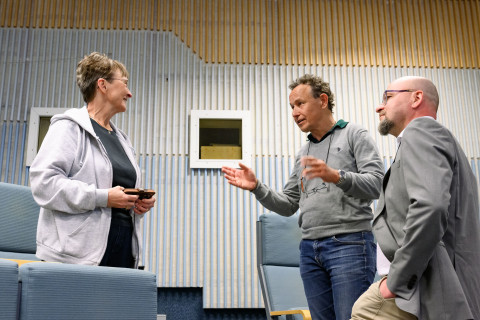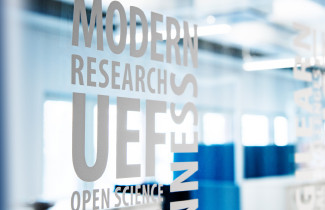“One absolutely can change their research topic after the PhD. Indeed, it is essential to adopt new perspectives and methods during the post-doc phase,” said Professor Christian Haass, speaking at the Neuroscience Research Community’s spring seminar in Kuopio. For early career researchers, the seminar provided an opportunity to exchange ideas with Haass about what it takes to build a meaningful and successful academic career.
Professor Haass, from Germany, was awarded an honorary doctorate in medicine at UEF’s doctoral conferment ceremony in June, and he is an internationally renowned scholar of Alzheimer’s disease and frontotemporal dementia. Haass currently works at Ludwig Maximilian University of Munich and at the German Center for Neurodegenerative Diseases, DZNE.
Haass’s own research career began at the University of Heidelberg, where he studied cellular mechanisms related to proteasome functions in fruit flies. He moved into Alzheimer’s research as a post-doc researcher at Harvard University in the US. Having considered several American universities and research groups, Haass switched research groups while still in the process of applying to Harvard. “I met Dennis Selkoe, who was studying the amyloid hypothesis, and we instantly clicked. This changed the direction of my life and led to numerous joint publications later. I also gained the academic freedom I was looking for,” Haass said.
He pointed out that a research career cannot be planned in detail, as coincidence plays a role, too.

Get a feel of the research group’s atmosphere
“The most important thing for an early career researcher is to have good mentors. Ideally, this kind of a mentoring relationship is something that will naturally develop between the doctoral researcher and their supervisor. My PhD and post-doc supervisors turned out to be super mentors who have supported my career all the way to a professorship – and are still my friends,” Haass said.
“The researcher, too, should assume responsibility for finding a good supervisor, and when looking for one, it is wise to talk to other members of the research group. The group should be like a family for researchers, and I would not join a group with a clearly competitive atmosphere, where everyone is working strictly on their own projects, and where there is little collaboration."
"In a group with a conversational atmosphere and no unnecessary hierarchy, you can also safely test your ideas, decreasing the possibility of error.”
Haass encouraged early career researchers to have the courage to approach leading scholars in their field. “Many of us feel responsible for younger researchers and are happy to help them advance in their careers.”
"It is also good that early career researchers unionise and stand up for their rights. Academia, too, has its problems that must be addressed.”
Follow your instincts and take risks
Securing funding is a critical question during the post-doc phase. When it comes to competing for funding, Haass notes that the most important thing is to have an excellent research proposal, but one also needs to know the requirements of different funders. "Applying for funding gets easier when you have good publications.”
According to Haass, following one’s instincts and enthusiasm can pay off in research work. “You should feel happy about going to the lab in the morning. If you strike gold, keep digging.”
During the post-doc phase, researchers often go abroad to do research. “Nowadays, many European countries offer good opportunities for molecular and cell biology research. I used to recommend American universities, which had fantastic research environments and a unique atmosphere. I’m annoyed by no longer being able to recommend them.”
He believes that academic work is the best kind of work. “You get to meet intelligent, enthusiastic people and have great conversations with them, and you are more or less free to do what you want. Unlike in the corporate world, you own the results of your work. You get to contribute to your field and even to patient care.”
“It is difficult to keep research separate from other aspects of life. However, there must be other passions in life besides work,” said Haass, who also spends time watching birds.
"Believe in yourself, have the courage to take risks and do not settle for compromises. Don’t lose your individuality. It doesn’t matter if you are different, so too are many Nobel laureates,” Haass said, giving advice to early career researchers.

Timing can be decisive for treatment effectiveness in Alzheimer’s disease
Haass collaborates with the Neuroscience Research Community at the University of Eastern Finland, particularly in research into microglial cells. Microglia are immune cells of the brain, and their dysfunction can contribute to Alzheimer’s disease.
For example, mutations in the TREM2 gene expressed in microglia impair the function of the TREM2 receptor and, consequently, the ability of microglia to combat pathological changes. At the seminar, Haass presented results from an antibody therapy that activates the TREM2 receptor. The antibody, named 4D9, has been shown to reduce the accumulation of the harmful beta-amyloid protein in the brain.
However, Haass noted that treatment effectiveness is dependent on precise treatment timing in relation to disease progression. “The optimal stage for treatment must be accurately determined, and we are also developing methods for this.”
Strengthening expertise in neurobioinformatics and electrophysiology
The use of data and new technologies in brain health research is one of the profiling areas of the University of Eastern Finland, to which the Research Council of Finland's PROFI8 funding is allocated. The Neuroscience Research Community has secured 3.3 million euros in funding, which will be used to recruit new experts to develop methods related to neurobioinformatics, electrophysiology and the production and genetic modification of stem cells, as well as to support other researchers in their use.
Researchers with robust expertise in bioinformatics include Senior Researcher Anssi Lipponen and Postdoctoral Researcher Juho Mononen, who work to promote the use and integration of various registry and omics data in neuroscience research, Mononen particularly from the perspective of neurometabolism. Staff Scientist Anssi Pelkonen is responsible for in vitro and ex vivo methods in neurological electrophysiology, and Senior Researcher Pedro Andrade for in vivo methods.
The multidisciplinary Neuroscience Research Community at the University of Eastern Finland comprises a total of 20 research groups, whose research spans from biological neurosciences to data sciences, neuro-innovation and neuroethics. According to Professor Mikko Hiltunen, the Research Community’s director, the spring seminar will from now on be held annually under a changing theme, so that the Research Community’s researchers can get to know each other’s research in a comprehensive manner.




